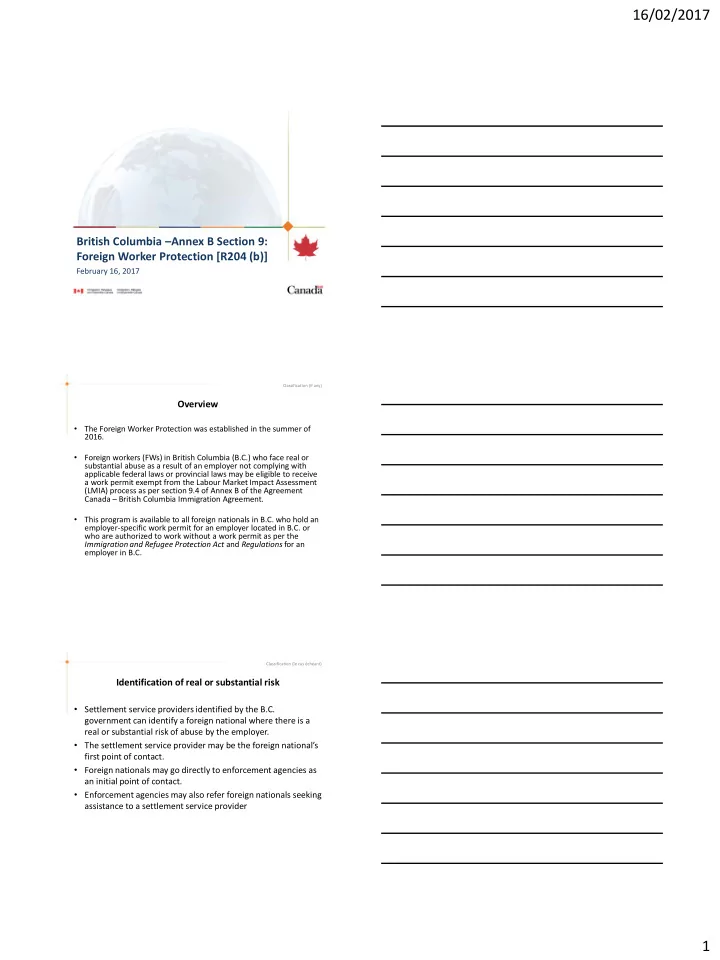

16/02/2017 British Columbia – Annex B Section 9: Foreign Worker Protection [R204 (b)] February 16, 2017 Classification (if any) Overview • The Foreign Worker Protection was established in the summer of 2016. • Foreign workers (FWs) in British Columbia (B.C.) who face real or substantial abuse as a result of an employer not complying with applicable federal laws or provincial laws may be eligible to receive a work permit exempt from the Labour Market Impact Assessment (LMIA) process as per section 9.4 of Annex B of the Agreement Canada – British Columbia Immigration Agreement. • This program is available to all foreign nationals in B.C. who hold an employer-specific work permit for an employer located in B.C. or who are authorized to work without a work permit as per the Immigration and Refugee Protection Act and Regulations for an employer in B.C. Classification (le cas échéant) Identification of real or substantial risk • Settlement service providers identified by the B.C. government can identify a foreign national where there is a real or substantial risk of abuse by the employer. • The settlement service provider may be the foreign national’s first point of contact. • Foreign nationals may go directly to enforcement agencies as an initial point of contact. • Enforcement agencies may also refer foreign nationals seeking assistance to a settlement service provider 1
16/02/2017 Classification (le cas échéant) Work Permit Issuance • Officers may consider issuing a work permit for up to 180 days in the following situations: • Employer non-compliance with provincial laws e.g. not paying the wages owed to the foreign worker or fails to correct unsafe working conditions at the detriment of the foreign worker. • Employer non-compliance with federal laws e.g. failing to provide a workplace that is free of abuse. Classification (le cas échéant) IRCC may issue work permits for the following purposes: • To regularize the temporary foreign workers’ status in Canada; • To facilitate the participation of foreign workers in the inspection or prosecution of an alleged employer or employment agency for non-compliance in Canada, or otherwise assist authorities; • To facilitate a change of employers for a temporary foreign worker who must leave their place of employment which placed them at risk; or • For any other purpose the officer may judge relevant to facilitate the protection of the TFW at risk as a result of potential employer non-compliance. Classification (le cas échéant) Requirements • Foreign workers should provide the following documents: – Proof that an official complaint to the appropriate enforcement agencies regarding potential employer non-compliance has been filed. – A written recommendation from an approved settlement service, including: o a brief summary of the case; o a copy of the official complaint form filed with the enforcement agencies o an indication of which provincial and/or federal law(s) have not or appear to have not been complied with; o a description of the risk faced by the FW; and o Contact information for the FW. – Any supporting or additional material such as a victim impact statement may be included by the approved settlement service provider to assist officers in reviewing a case. • Upon receipt of a recommendation from the settlement service provider, IRCC officers will arrange an in-person or telephone interview with the FW if required. 2
16/02/2017 Classification (le cas échéant) Type of work permit issued • An open work permit under a Labour Market Impact Assessment exemption or an employer specific work permit if the foreign worker has obtained a new job. • Both types of work permits will be processed on an urgent priority basis. Classification (le cas échéant) Spouses or common-law partner • Spouses may have their work permits issued under the same program and for the same duration as the principal applicant. • Spouses must also submit a completed application and fees, including evidence of their relationship (marriage certificate). Classification (le cas échéant) Enforcement Agencies • Foreign workers under this protection program may contact: • ESDC tip line 1-866-602-9448 or use the Online Fraud Reporting Tool • Human Rights Tribunal • The Canada Border Services Agency • The Royal Canadian Mounted Police • WorkSafeBC • Employment Standards Branch of the B.C. Ministry of Jobs, Tourism, and Skills Training 3
16/02/2017 B.C. workers at Risk Victims of Human trafficking B.C. workers at Risk and Victims of Human trafficking Foreign workers (FWs) in British Columbia The recruitment, transportation, transfer, (B.C.) who face real or substantial abuse as a harbouring or receipt of persons, by improper result of an employer not complying with means, such as force, abduction, fraud or applicable federal laws or provincial laws coercion, for an improper purpose, such as forced or coerced labour, servitude, slavery or sexual exploitation. B.C. settlement service providers identify a A person self-identifies or is referred to IRCC by foreign national where there is a real or a non-governmental organization (NGO) or law substantial risk of abuse by the employer. enforcement authority. o o An official complaint to the Consultations between IRCC and partner appropriate enforcement agencies. law enforcement agencies. o A written recommendation from an o An interview may be required with IRCC and approved settlement service. potential victim to establish the facts of the case. Vancouver IRCC processes applications. Local IRCC offices must process these applications. Open or employer specific work permit issued A TRP valid for at least 180 days makes the for up to 180 days. holder eligible to apply for a work permit. 4
Recommend
More recommend